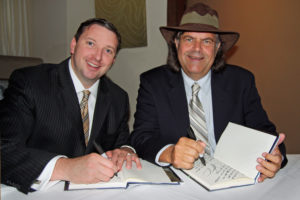Story & Photography by Gail G. Collins
 Set in the Bayou City in 1974, the financial thriller, Bond Daddy, takes readers into the inner workings of a bond market boiler room. Attorney turned author, Jason Fowell, and securities broker turned author, John Bott, give readers a rare glimpse into the high-pressure, deceptive, and coercive sales tactics used to lure investors into purchasing stocks and securities.
Set in the Bayou City in 1974, the financial thriller, Bond Daddy, takes readers into the inner workings of a bond market boiler room. Attorney turned author, Jason Fowell, and securities broker turned author, John Bott, give readers a rare glimpse into the high-pressure, deceptive, and coercive sales tactics used to lure investors into purchasing stocks and securities.
The writing duo from Cy-Fair recently celebrated the release of their lengthy endeavor with a local book signing. Greeting guests, Bott says, “The worst complaint I’ve had about the book is that it isn’t long enough.” Fowell pipes up, sharing, “Five years in the making—it was brutal coming home each night and opening a bottle of wine to work on a book that wrote itself.” The sophisticated atmosphere and the coauthors’ playful attitudes take a gentle swipe at the over-indulgence that permeates Bond Daddy.
Plotting a Big Payoff
The plot is best summed up on its Facebook page where the authors write, “The lure of fast money pulls two best friends, Aaron and Jack, into a world driven by high-pressure commission sales where morals and ethics take a backseat to big payday… Surviving the firm’s grueling interview process, harsh cold-calling and aggressive tactics, each takes a different path in an attempt to endure the shark-infested trading floor.”
Fowell, who works with Essmyer, Tritico & Rainey LLP, is the lawyer and pin-striped suit of the author duo and says, “I wrote most of the book with John feeding me the stories.” Bott began to write the tale 15 years ago, but more recently when Fowell expressed an interest, he handed off the first five chapters.
“John stopped writing because he was having too difficult a time putting it together,” says Fowell, adding, “However, his stories were captivating, and it gave me a great start. He originally had about 25 characters, but that’s a movie, not a book.” They trimmed the line-up and created hybrid players to carry on the outrageous behavior found within the book’s pages.
“The stories are incredulous. Commissions were treated like lottery winnings, and they spent them all.” Jason Fowell

Shocking Events and Excesses
“It was a Good Ole Boys community,” says Bott, a broker-dealer for Tri-Star Financial who co-anchors What’s Working Now, a 6.50 AM radio financial broadcast. “Women and [African Americans] were coming into professional and high-paying jobs, and many didn’t want to see that transition. It brought into focus the prejudices – what [African Americans] and women had to overcome to succeed. ” Females are present throughout the book, but most play a decorative role. “Breast implants were written off as marketing expenses. That’s the kind of world it was,” Bott says. “Still, Jason used a lot of creative license.” Though readers try to pin the role of Jack on Bott, in reality, he was more the man on the ground bearing witness to the shocking events and excesses.
Fowell wrote a fictional story line that encompassed as many of these incidents as possible. He ran with the project for about 50 pages before sharing his work with Bott, but says, “John loved what I did, and helped me edit and revise as we went on from there.” The first draft conveyed scenes as they were, but they needed to tone the language down. “The stories are incredulous. Commissions were treated like lottery winnings, and they spent them all. They made $10,000 in the morning and played golf the rest of the day. There is a sophisticated image, but they’re really glorified salesmen. Greed is a constant.”
“It was a Good Ole Boys community. Women and [African Americans] were coming into professional and high-paying jobs, and many didn’t want to see that transition. It brought into focus the prejudices – what [African Americans] and women had to overcome to succeed. ” John Bott
And it is this greed that undoes the story’s characters. Early on, the firm’s head man, Strong, warns his protégé, “Remember, the pigs get fat, and the hogs get slaughtered.” It is an omen.
A Story for the Books
Fowell felt vulnerable putting himself in the public eye on a new career path as writer. He’s a man bound by case law, rules, and precedent, but says, “The book allowed me to be creative.” Writing two or three times a week in the evenings – with a bottle of wine and a fish tank to contemplate instead of a blank page – it took Fowell about four years to finish the manuscript. Then, the authors hired a professional editor to review it – a grueling process. “Some days I loved her, and some days, I hated her, just as the editor said I would,” recalls Fowell. After that, he sought agents to market the book for a year before deciding to self-publish. “We didn’t want to miss this time in the market [with the recent financial meltdown]. It’s a slice of Houston’s history that brushes with the mafia and people end up dead,” he says.

